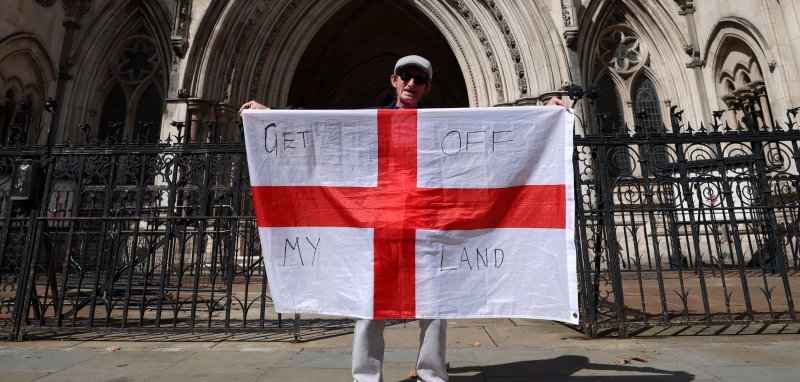Immigration and asylum policies have long been flashpoints in the United Kingdom’s political and social debates. In recent years, the government’s decision to house asylum seekers in hotels has drawn increasing criticism from both the public and politicians. While officials argue that the measure is necessary due to limited accommodation, local communities and advocacy groups have voiced concerns ranging from financial costs to social integration challenges.
In a landmark decision, a UK court recently upheld the government’s policy, allowing the continued use of hotels for asylum seekers despite widespread opposition. This ruling highlights the ongoing tension between humanitarian obligations, public opinion, and the limits of state resources.
This article explores the ruling in detail, examines the perspectives of key stakeholders, and looks at what the decision means for asylum seekers, local communities, and the future of UK immigration policy.
Background: Why Hotels Are Being Used for Asylum Seekers
The practice of placing asylum seekers in hotels has grown significantly over the past decade.
A Growing Asylum Crisis
According to the UK Home Office, more than 74,000 asylum applications were lodged in 2023, the highest figure in two decades. With the system under immense strain, the government has turned to hotels as a stopgap measure due to:
- Overcrowded reception centres.
- Delays in processing asylum applications.
- A shortage of permanent housing.
Costs of the Policy
Reports suggest the UK is spending more than £6 million per day on hotel accommodation for asylum seekers. This figure has become a rallying point for critics who argue the money could be better spent on public services like healthcare, housing, or education.
The Court Case and Ruling
The court challenge came after several councils and community groups pushed back against the government’s use of hotels in their local areas. They argued the policy was unsustainable, unfairly burdened communities, and violated planning regulations.
Key Arguments from Opponents
- Local strain: Communities claimed public services were overwhelmed by sudden arrivals.
- Transparency: Councils complained they were often given little notice about hotel placements.
- Fairness: Critics said poorer areas were disproportionately targeted.
The Government’s Defense
The government countered that it was acting within the law to meet its international obligations. Officials argued hotels were a “last resort” option to prevent asylum seekers from being left homeless.
The Court’s Decision
The judge ultimately sided with the government, ruling that while the policy was imperfect, it did not breach UK law or international obligations. The court stressed the humanitarian duty to provide safe shelter and acknowledged the government’s limited alternatives.
Public Backlash and Rising Discontent
Despite the court ruling, public frustration continues to grow.
Community Concerns
Residents in towns where hotels are used often raise concerns about:
- Safety and security.
- Pressure on local schools and health services.
- A lack of consultation with communities.
Media and Political Narratives
The media has amplified cases of tensions between asylum seekers and local residents, while opposition parties have accused the government of “failing both refugees and taxpayers.”
Polls Reflect Unease
A recent survey suggested nearly 60% of Britons disapprove of housing asylum seekers in hotels, with concerns about rising costs topping the list.
Human Stories: The Other Side of the Debate
While much of the discussion has centered on costs and community backlash, the lived experiences of asylum seekers paint a different picture.
Life in Hotel Accommodation
Many asylum seekers describe hotel living as lonely, restrictive, and uncertain. Families often live in cramped rooms, sometimes without access to cooking facilities. Children struggle with disrupted schooling, and adults face mental health challenges due to long waits for their cases to be processed.
Voices from Advocacy Groups
Charities such as Refugee Council and Migrant Help argue that the focus should not be on hotels themselves, but on the systemic delays in asylum processing that leave people stuck in limbo. One advocacy worker noted:
“Nobody wants to live in a hotel for months on end. Asylum seekers want dignity, work, and the chance to contribute, but the system keeps them idle.”
Financial Burden and Policy Alternatives
The financial cost of housing asylum seekers in hotels has become a political flashpoint.
How Much Is Being Spent?
- The UK government spends over £2 billion annually on hotel accommodation.
- This figure has more than doubled since 2020 due to rising asylum claims and processing delays.
Proposed Alternatives
- Repurposed Military Bases – The government has proposed using disused military facilities, though these plans have also faced backlash.
- Barges and Temporary Camps – Controversial proposals include housing asylum seekers on barges, sparking safety and ethical concerns.
- Community Housing Partnerships – Some experts advocate for partnerships with local councils to create more sustainable housing.
Political Reactions
Government’s Stance
The Home Office welcomed the court ruling, saying it confirmed the UK was acting within its legal rights and international obligations. Officials insisted that long-term reforms are being developed.
Opposition Criticism
Labour leaders accused the government of “chaotic mismanagement,” pointing out that reliance on hotels reflects a broken asylum system.
Local Councils’ Response
Many councils continue to push for greater consultation and fairer distribution of asylum accommodation across the country.
International Context
The UK’s struggles are not unique. Other European nations, including Germany, France, and Italy, have also faced challenges accommodating large numbers of asylum seekers.
Comparative Approaches
- Germany has relied heavily on community housing projects.
- France has used both temporary shelters and repurposed buildings.
- Italy has faced criticism for housing asylum seekers in overcrowded camps.
The UK’s reliance on hotels is unusual in its scale, and critics argue it signals deeper systemic inefficiencies.
Long-Term Implications
The court ruling ensures the use of hotels will continue for the foreseeable future, but it also raises deeper questions about the future of UK immigration policy.
What This Means for Asylum Seekers
- Continued uncertainty and lack of stability.
- Prolonged waiting times for case processing.
- Ongoing mental health challenges.
What This Means for Communities
- Strain on local resources.
- Continued political polarization.
- Risk of rising tensions without transparent communication.
FAQs
Why is the UK using hotels for asylum seekers?
Because of a sharp increase in asylum applications and limited housing capacity, the government has turned to hotels as temporary accommodation.
How much is the government spending on hotel accommodation?
The UK is spending over £6 million per day, amounting to more than £2 billion annually.
Why did the court uphold the use of hotels?
The judge ruled the policy, while imperfect, was lawful and consistent with the UK’s humanitarian obligations.
What are the main criticisms of the policy?
Critics argue it is too expensive, puts pressure on communities, and reflects failures in the asylum processing system.
Are there alternatives to using hotels?
Yes. Alternatives include repurposed military bases, barges, and community housing partnerships, though each option has sparked its own controversies.
Conclusion
The UK court’s decision to uphold the use of hotels for asylum seekers has reignited debates about immigration, public spending, and community integration. While the ruling ensures temporary shelter for those seeking safety, it also underscores the urgent need for comprehensive asylum reform.
On one side lies the government’s responsibility to uphold humanitarian obligations; on the other stands public discontent over costs and community pressures. Striking a balance between compassion and practicality remains one of the UK’s most pressing challenges.
Until systemic reforms are implemented, hotels will remain the government’s fallback option — a symbol of both the UK’s generosity and its ongoing struggles to build an asylum system that is fair, sustainable, and effective.








